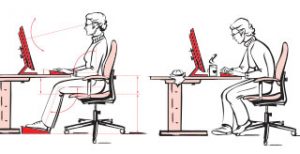- New Patient Line:
- (907) 336-0200

I’d like to share an interesting study I came across just a moment ago because it confirms an important concept that I see illustrated time and again in those who come to me for help. The study was conducted by researchers at the Kellogg School of Management and published recently in the January 2011 issue of Psychological Science. The researchers were comparing how the thoughts and behaviors of of people were affected by both physical posture and by hierarchical rank or title. They were surprised to find that posture had a more significant affect on behavior and psychology that did hierarchical rank. In other words, healthy posture had a strong influence on making a person think and act in a more powerful way.
While the results of this study may have come as a surprise to the researchers, the powerful effects of physical posture on mental and emotional attitudes is something that NUCCA practitioners see on a daily basis. We’re all very aware of how our mental and emotional state can affect our posture, right? When we’re feeling depressed and gloomy, our shoulders are slumped forward, facial muscles are slack, and our head hangs down so that we’re staring at the floor. But when we’re happy and excited, it’s just the opposite: head held high, shoulders back, chest out, and a big smile on our face.
But here’s the little secret that nobody told you: it works the other way around! Just try it. Next time your feeling depressed, force your body posture into the happy/excited posture–I promise you’ll have a much more difficult time feeling depressed. When you’re feeling happy, slump yourself into that depressed posture and see what happens. You won’t be able to stay there because your physical and mental bearing are inextricably linked in ways that we’re just beginning to understand.
But what happens when you can’t pull yourself out of a slump no matter what you do? I’ve worked with a great many individuals who struggle daily with depression and anxiety. Oftentimes we find that they exhibit a postural syndrome that’s known as the Atlas Subluxation Complex Syndrome. What’s so dangerous to these individuals with depression and anxiety is the double whammy that they get from this syndrome. Not only does it affect their posture, which has such a significant affect on their mental and emotional state of mind, but it also can affect brain chemistry and hormonal regulation, which can often be the primary instigator of their problems.
The good news is that, when corrected, these individuals can often regain the healthy, happy state of mind that they need in order get back to being the loving, productive, reliable person they used to be. And it can be done without the use of dangerous mood altering drugs with unknown long-term side-effects. These drugs are often prescribed as a first line of defense when they should really be restricted to serving their proper role as a final desperate solution. If you or someone you care about is dealing with mental or emotional problems, have them find out if there is a NUCCA practitioner near their area. Discovering the nature of the problem is the first step in solving it, and NUCCA may be able to help do just that.

